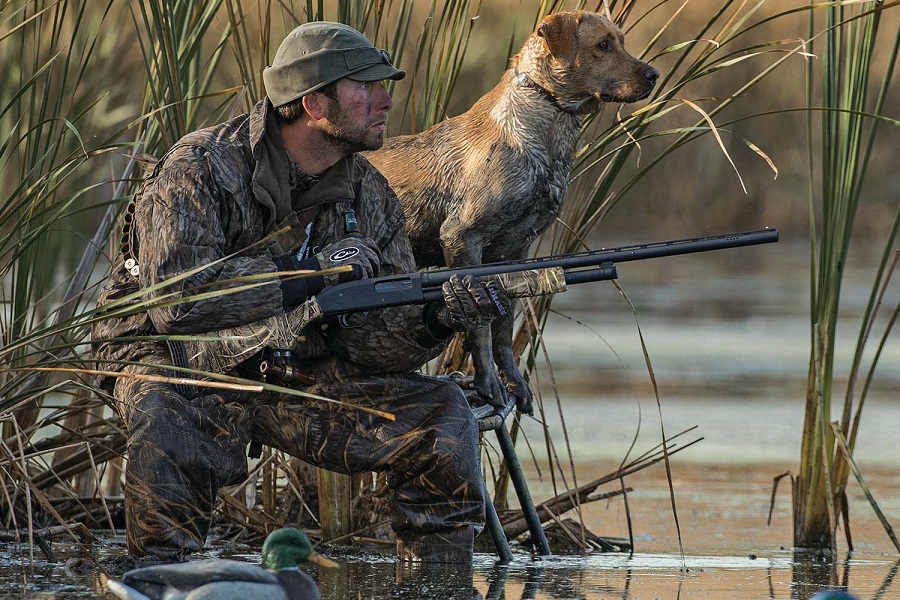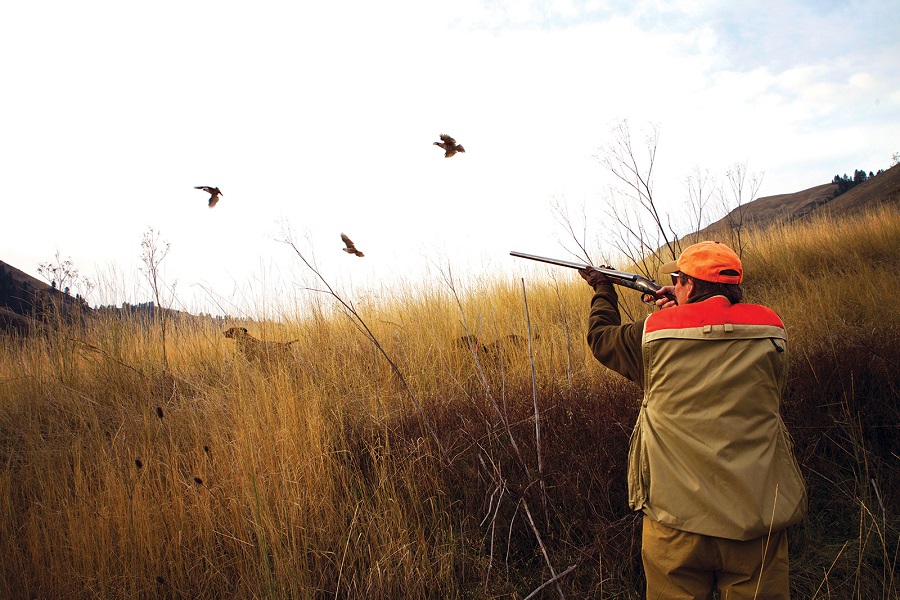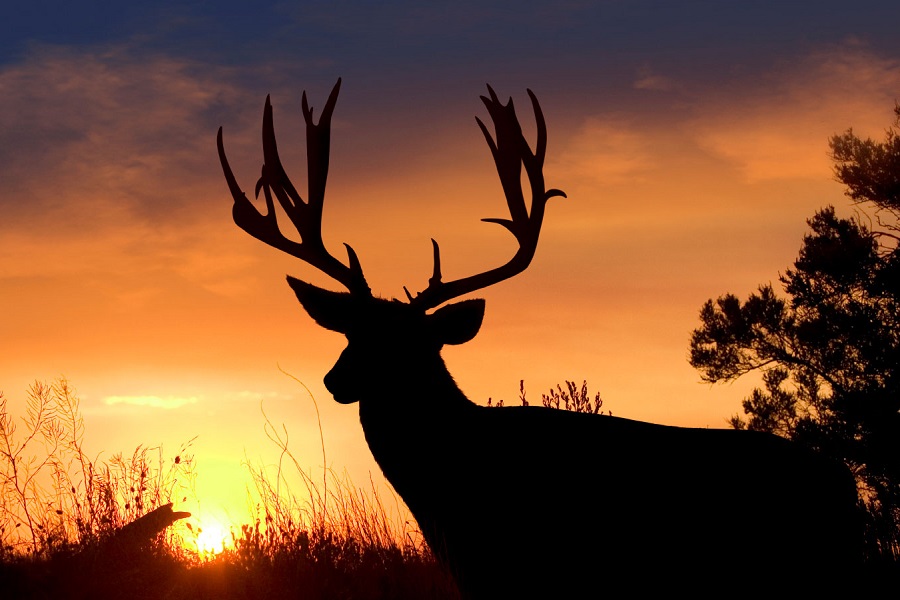Have you wanted to learn how to get into hunting but never had any experience? Many hunters were never brought out while they were children and have to learn as adults when their interests are piqued. This is your resource to help you transition from your current life to one that involves a healthy amount of hunting.
We’re constantly told that the best time to learn anything is when we are children.
There’s a lot of truth to that, but all it means is that we need more conviction and commitment as adults to dedicate ourselves to something, which shows how badly we want it.
You want to learn? This is how to get started.
Finding The Right Mindset To Get Started With Hunting
First and foremost, are you ready to commit to following through with a shot and taking the life of your prey? It’s a grim way to look at it, but it’s the truth. If you can’t at least begin the process of mentally preparing to take the life of an animal, then you will have a difficult time when the day comes to gear up and trot onto hunting grounds. Sleep on that one while you consider other aspects of getting started with hunting.
Next, decide what you want to do. There is different gear and preparation for hunting small game versus big game. Pheasants and grouse don’t have the same approach as elk and moose. What could you see yourself hunting, and how would you see yourself doing it?
As a preliminary step before you jump in with both feet, you can get your Hunter’s Safety Card (required for licensing) and simply talk with other hunters during safety courses. Find online hunter communities for your area and see when they are meeting. See if you can tag along for a hunt as an observer so you can get into the mindset, or simply ask for advice to see if it’s the life for you.
So there’s a bit of mental preparation to get things going. We mentioned the Hunter’s Safety Card, which is required for licencing, but now let’s discuss all other types of licencing you might run into while getting into hunting.
Different Licencing That Will Be Required For Hunting

It gets messy when you try to look at how laws from one state overlap those of a neighboring state. Everywhere is different, so how do you figure out what you need for hunting? Well, there are three major licenses or permits you need before you set foot on a hunting trip.
Hunting Licence
This will be your biggest challenge. It’s not difficult, but it is time-consuming and really tests if hunting is something you want to get into. First things first, you need to apply for a Hunter’s Safety Card. In order to do so, you’ll have to find information about your state’s programme online. Every state could have a different safety course time that they expect, but the good thing is that once you get your Hunter’s Safety Card, it is acceptable in all fifty states.
You will be required to take an online course as your next step. After you learn everything through either online learning materials or attending classes, you will take your course and be given an immediate answer on whether you passed or not. The threshold is usually around 80% passing scores in most areas.
Print out your certificate of completion and submit it to purchase your actual license. Most states (currently 35 at the time of writing this) have simple online methods to get your hunting licence, which include a 7–10 business day mailing time to receive that licence in the mail. On occasion, you might see some wait times exceed 15 business days, or three full calendar weeks. This is why it’s important to get your licence well before you actually need it.
Weapon Registration
We don’t need to stress the state of guns in the United States—it’s always a struggle, and sometimes it makes registering your weapons more difficult. No matter, you’ll still be able to register your gun with the proper documentation.
Every state operates differently, but you will need to have a licence to operate a firearm before you can even register one. For that, you will need to apply for a gun owner’s licence through the state police or through a probate court (for users aged 21 and older). That involves a simple background check and an online application process.
Weapon registration can get pricey depending on the capabilities, size, and initial purchase price of the weapon, but registering to own a gun is not expensive. Postage times may vary, but normally, you can expect to get your gun licence within 7–10 business days after your original order. Licence lengths will be stated with an effective and expiration date on them, but most tend to last for around five years.
Concealed Carry
This goes for both gun concealed carry as well as concealed knife carry. Yes, it’s a thing. You need to be registered for both if you plan on using either, because the stipulations for what counts as concealed carry can vary depending on the situation. Simply storing a knife safely can count as concealed carry.
Permits are required and are specific to each state. If you’re in one state with a 4″ knife length limit, it doesn’t mean anything in a state with a 3 12 length limit. It’s null and void, and you will be subject to a fine. Some states outlaw concealed carry knives altogether but allow open carry. You have to inspect your specific municipality’s laws.
How To Find And Use Public Land For Hunting

So you want to use public land for hunting? That’s great, and it’s basically free, so why not? The problem is that everyone else has the same idea. For all you know, you’re reading this at the same time as your neighbour, and you’ll bump into each other on public land when the season opens up.
Public land has its upsides and downsides, so let’s discuss exactly how to hunt down public land and ensure you get the very best chance of tracking game.
Contacting Clerks And Finding Public Information
First things first: you need to find out what land is public and what isn’t. That’s not always an easy task because most states don’t have a way for you to look that up. Minnesota was one of the first states to have an online resource where you could access information on public plots of land. There will usually be a directory and a map (they usually piggyback off of Google Maps), and you can see public land.
Then, there are some states where that’s not an option. Sometimes, you’ll have to actually go into an office and request information, which comes in a non-digital format. Given how we digitise everything nowadays, it’s going to be a bit of a pain to properly locate that information. Most clerks that work at offices will help you out with deciphering information and tell you about public land plots (they get these inquiries all the time, so they know it like the back of their hands).
See For Yourself
You can use Google Earth to start looking for the right spot before you head out. Find somewhere that looks lightly travelled, and stick with it. We hate to paint a picture of most hunters, but people in general are just lazy and will only travel inland as much as they need to (or think they need to) for hunting.
You can get one-up on them by going a little farther than is necessary. One of the problems with public hunting land is that it’s accessible to anyone, so you will have days where you’re dealing with large crowds. That’s a collective scent that whitetail deer and antelope will stay away from, so the bigger the group, the less likely you are to find any prey. Whitetail can smell twenty miles out, and you better believe they have the range and capabilities to get out of harm’s way.
Use Google Earth to find an off-beat spot, then casually visit it for yourself and see if it’s going to work out for you.
Hit The Range
Are you handy with a rifle? If not, it’s time to get started with handling and aiming control. Go to the firing range and start off small with about twenty shots. Focus on aim and breathing control, and take your time with each shot.
In the wild, when you run into a deer, you’re not going to just pull the rifle up and squeeze the trigger,you’re going to have a moment where you try to remember the anatomy of that deer, where the bullet would be most effective and least likely to break off into the meat, and then focus your shot before actually pulling the trigger.
If you’re thinking about doing bow hunting or crossbow hunting, that actually requires even more practice and skill to get down pat. You can find an archery range to practice your skills. Arrows travel quickly but slower than bullets, so when you’re trying to hit a target that’s far away, you’re at the mercy of a slower shot, wind speeds changing your arrow’s path (slightly), and an arc that can alter your shot. There’s a lot to consider.
If you can’t land your shots, then it’s not time to get out and hunt. It can take hours and extreme patience to even locate your first deer or antelope, and at that point, you really do not want to miss your shot.
Missing after tracking, waiting, and hunting will feel like a kick in the gut. Practice during the off-season just to keep your skills sharp.
Work On Confidence
You’re going into the woods and taking an animal’s life. After you’ve been hunting for quite some time, it’s not going to feel like you’re invading that animal’s land, and it will get easier to listen to your instincts, but in the meantime, you have to have confidence when you begin hunting.
It would take all day to put the information here, but you need to learn everything about the prey you are hunting. Most first-time and amateur hunters make the mistake of thinking that getting ready is 100% about them and their capabilities, but your capabilities won’t do you much good if you don’t know the eating patterns, diet, habits, required daily water, and grazing range for the animal you’re hunting.
No matter what you want to hunt out of the “Big 29”, you will start off thinking you know more about that particular game than you actually do. We’ve all done it. Whitetail deer, for example, seem like the most basic creatures in the wild.
That’s because we run into them on the highway, they run through our backyard, and they can actually be a nuisance to us. That doesn’t mean their eating patterns aren’t complex and need to be learned in order to better hunt them.
Confidence comes from surety, which comes from knowledge. You don’t have to be a walking encyclopaedia on hunting, but you do need to have a proper working knowledge of the area you’re going to be hunting in, mastery over your equipment, and survivalist information for the worst-case scenario.
It’s when we’re out on the hunting trail that bad thoughts can creep into our heads and make us feel unprepared, but confidence will overpower that.
Do A Gear Checklist
You wouldn’t tell a butcher to cut a steak without a knife, and you wouldn’t tell a hunter to bring home dinner without his gear. Here’s a quick checklist of things that you’re going to need on your hunting trip.
- GPS/compass
- Sunscreen
- Insect repellent
- Tree stand
- Game carrier
- Route tape
- Trail camera
- Hunting backpack
- Water bottle
- Durable hunting boots
- Hunting jacket with hunter orange
- Hunting pants
- Long underwear
- Sturdy belt
- Moisture-resistant socks
- Gun or crossbow
- Ammunition
- Cell phone/communication
Gear up, get ready to head out, and double-check that you have everything you need. This is just a basic list, and not all of it will apply to you. You might need winter gear instead of basic hunting jackets or something stronger than insect repellent, like a repelling lamp. Take this with a grain of salt and adjust it as you see fit.
Are Overnight Camping And Hunting Trips Better?

For some of us, hunting trips are as much about the love of the game as they are about getting some peace and quiet. The nine-to-five grind gets you down from time to time, and this is a cut-off way to get back to what makes you happy and focus on you. You don’t need to camp overnight to go on a hunting trip, but it can be a good idea.
Earlier, we mentioned that if you go onto public land with a lot of people, you might not see enough deer. They get spooked. Well, sometimes when people visit the same hunting spot year after year and it’s used by multiple people, deer get wise to the spot and don’t go over there as often.
If you’re camping overnight, you have more time to get deeper into the woods, into an area that likely hasn’t been tampered with much in the past. That leaves the wildlife unsuspecting, so you will be more likely to land your mark, but you’ll have a longer way to transport your haul.
Do I Need A Tree Stand To Be A Good Hunter?
It’s not required, but it’s recommended for deer hunters. Deer can smell in a horizontal pattern and have very little awareness of what’s directly above them. In nature, they don’t have predators that come down from trees, so there’s never been a need for them to keep their eyes on the sky. Bears sometimes climb trees, but they don’t leap out of them just to attack deer.
A tree stand will test your patience and ability to stake out deer grounds. You could potentially spend eight hours in a tree stand with no result, or you could plan it out accordingly and spend a couple hours there and bag one or two kills. It’s all about how you place it.
Do I Need Hunter Orange Clothing?
Yes, otherwise you could face a fine by the state police or local government. IHEA safety ratings on Hunter Orange are there to prevent accidents and make your clothing vibrant if a search party ever had to come looking for you. Fines can be around $500 or more for failure to comply with the law.
Every state has different minimums of square inches of hunter orange visible on your clothing, and some states don’t even have a minimum requirement. For good measure and to be a thorough hunter, you should always wear hunter orange while hunting.
How Much Land Is Required To Be Able To Hunt?
Generally, you want at least 25 acres per person, up to two people. 50 acres for two people After that, you should have about 100 acres for 3 people, 200 for 4 people, and so on. For some context, it takes 640 acres to make one square mile, which is a lot of space to consider. Think of how many people could be on public land and fill up spaces like that, and now you see why public land is difficult to hunt on.
But there are other things to consider. If you’re on public land, you do run into some problems with miniscule plots. Public land doesn’t have a set size requirement, so you could run into a one-acre plot of land that technically has huntable wildlife on it. Not every plot of land will have ideal hunting conditions.
Even though it’s public land, if you shoot a deer and it runs through someone’s yard (after you have shot it) and destroys property, you could be held liable. You’d better be sure that you’re a good shot. It gets a bit dodgy, but that’s why it’s best to find large plots of public land with 100 acres or more.
If it’s too close to industrialised businesses or residential areas (it’s common to see these plots near new suburb developments), you might run into a fairly scarce population of deer, but the small game numbers should still be high. Deer are skittish creatures that spend their lives evading danger.
Is It Legal To Hunt On Your Own Property?
Yes, but no. It gets complicated, so let’s go over it as simply as possible. You may own the land, but you do not own the animals that travel on it. They’re seen as public property to be hunted on public lands, so you don’t have the right to just shoot a deer in your backyard and begin cleaning the game.
However, there are some states with animals that are open season or considered nuisances by the state. Feral boars and turkeys are usually among these, but even so, you’ll need to be 100% certain that you’re not going to get in trouble for hunting these on your own property.
It also comes down to intent. If you own 100 acres of land and you go onto it with your hunting gear, it will look like you were intentionally trying to hunt on your own private property, and the odds will stack against you.
That, of course, means that you would have had to be seen by someone on your private land, doing something that most people don’t realise is illegal.
In most states, you can’t even fish on a pond you own on your own property for the same reasons. Even though it’s a controlled body of water and you’re not just going to have random people come onto your lawn to fish, it falls into the same category.
You’ll find that there are a lot of archaic laws surrounding hunting on your own property, and they’re not prioritised enough for anyone to change them anytime soon.
What Is The Minimum Age For Legal Hunting?
It varies from state to state, and while it’s subject to change, it’s rare for any state to change its position on youth hunting. Here’s a quick breakdown of each state and their minimum big game hunting age.
- AK: 10 years old
- AL: No minimum age
- AR: No minimum age
- AZ: 10 years old
- CA: 12 years old
- CO: 12 years old
- CT: 12 years old
- DE: 10 years old
- FL: 16 years old
- GA: 12 years old
- HI: 16 years old
- IA: 11 years old
- ID: 12 years old
- IL: 16 years old
- IN: No minimum age
- KS: No minimum age
- KY: 12 years old; details apply.
- LA: 16 years old
- MA: N/A
- MD: 14 years old
- ME: 10 years old
- MI: 12 years old
- MN: 11 years old
- MO: 18 years old
- MS: 11 years old
- MT: 12 years old
- NC: 12 years old
- ND: 12 years old
- NE: 11 years old
- NH: 12 years old
- NJ: 10 years old
- NM: 18 years old
- NV: 12 years old
- NY: 12 years old
- OH: 17 years old
- OK: 10 years old
- OR: 18 years old
- PA: 12 years old
- RI: 12 years old
- SC: 12 years old
- SD: 12 years old
- TN: 10 years old
- TX: 9 years old
- UT: 12 years old
- VA: 16 years old
- VT: 12 years old
- WA: N/A
- WI: 10 years old
- WV: 15 years old
- WY: 12 years old
As a full disclaimer, some of these include requirements such as supervision and not being able to use a firearm in most circumstances. Generally, in states that allow ages 15 and under, a safety class is not required but strongly recommended.
In some states, at the age of 17, children will have to independently seek out a license to continue hunting their preferred game.
Hunting mentorship programs are available if you wish for your child to learn from seasoned professionals who spend their time teaching others.
Many states have laws that go back as far as 1966 regarding the minimum age and the requirement for anyone who will be hunting to take a hunting safety course that has been approved or accredited by the state.
You’re On Your Way

We hope you enjoyed this crash course on how to get into hunting and start from the ground up.
Whether it’s just an interest of yours or you’re trying to gear up to go hunting with your father-in-law for the first time, you can do this, you have a natural instinct to track, engage, and hunt prey, as is your right.
Get out there and bag your first trophy, there’s nothing stopping you now.
Resources:



